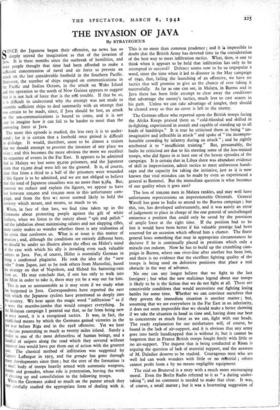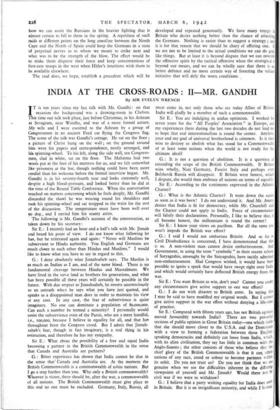THE INVASION OF JAVA •
By STRATEGICUS
SINCE the Japanese began their' offensive, no news has so deeply stirred the imagination as that of the invasion of Java. It is three months since the outbreak of hostilities, and most people thought that time had been afforded to make a sufficient concentration of naval and air force to prevent an attack on the last considerable foothold in the Southern Pacific.
Moreover, the number of ships engaged on communications in the Pacific and Indian Oceans, in the attack on Wake Island that it is not lack of force that is the real trouble. If that be so, is difficult to understand why the attempt was not made to assemble sufficient ships to deal summarily with an attempt that was certain to be made, since, if Java should be lost, an attack on the sea-communications is bound to come, and it is not :asv to imagine how it can fail to be harder to meet than the convoying force at Java.
The more this episode is studied, the less easy it is to under- stand ; for it is certain that a foothold once gained is difficult to dislodge. It would, therefore, seem to be almost a truism that we should attempt to prevent the invasion of any place we ; and this becomes the more obvious the more we recollect the sequence of events in the Far East. It appears to be admitted that in Malaya we lost some 95,000 prisoners, and the Japanese claim that 15,000 dead were left on the ground. It is, of course, clear that from a third to a half of the prisoners were wounded ,t this figure is to be admitted, and we are not obliged to believe that the total of Japanese casualties was no more than 9,384. But, however we reduce and explain the figures, we appear to have lost between roo,000 and llo,000 men in this unfortunate cam- paign, and from the first we never seemed likely to hold the territory which meant, and means, so much to us.
When, in face of that loss, we find time taken up in the Commons about protecting people against the gift of white feathers, when we listen to the outcry about " spit and polish " :ad the jubilation about minimising salutes and not slapping rifles, mere sanity makes us wonder whether there is any realisation of the crisis that confronts us. What is at issue is this matter of invasion ; and, although the conditions are entirely different here, we should be under no illusion about the effect on Hitler's mind of the ease with which his ally is invading even such valuable - centres as Java. For, of course, Hitler is essentially German in being a confirmed plagiarist. He took the idea of the " new order" from Japan, just as he took others from Mussolini, based his strategy on that of Napoleon, and filched his battering-ram from us. He may conclude that, if one has only to walk into the Mint in order to take it, there may yet be a way out for him.
This is not so unreasonable as it may seem if we study what has happened in Java. Correspondents have reported the ease with which the Japanese cyclists have penetrated so deeply into the country. We hear again the magic word " infiltration " as if it were the mumbo-jumbo that would conquer everything. In the Malayan campaign I pointed out that, so far from being new Or even novel, it is a recognised tactics. It was, in fact, the established means by which the Germans gained victories in the last war before Riga and in the 1918 offensive. Yet we hear CYC.iStS penetrating as much as twenty miles inland. Surely a cyclist is one of the most defenceless of human beings, and a handful of snipers along the road which they covered without 2Pparent loss would have put them out of action with the greatest "-'Ise. The classical method of infiltration was suggested by Captain Laffargue in 1915, and the graupe has gone through many developments since then ; but the core of the formation is a small body of troops heavily armed with automatic weapons, bombs and grenades, whose role is penetration, leaving the work 0'. cleaning up and consolidation to the following troops. When the Germans staked so much on the panzer attack they yell/ carefully studied the appropriate form of dealing with it. This is no more than common prudence ; and It is impossible to doubt that the British Army has devoted time to the consideration of the best way to meet infiltration tactics. What, then, is one to think when it appears to be held that infiltration has only to be attempted to succeed? Defence seems now to be so unpopular a word, since the time when it led to disaster in the May campaign of 1940, that, failing the launching of an offensive, we have no tactics that will promise to give us the chance of ever taking it successfully. As far as one can see, in Malaya, in Burma and in Java there has been little attempt to clear away the conditions that advantage the enemy's tactics, much less to cast snares in his path. Unless we can take advantage of jungles, they should be cleared away so that no cover is left to the enemy.
The German officer who reported upon the British troops facing the Afrika Korps praised them as " cold-blooded and skilled in in-fighting, experienced in assault and capable of standing up to all kinds of hardships." It is true he criticised them as being " un- imaginative and inflexible in attack " and spoke of " the incompre- hensible crowding by infantry during an attack " ; and he rightly attributed it to " insufficient training." But, presumably, the faults he criticised are due to his meeting some of the less-trained troops, who did figure in at least one of the heroic episodes of the campaign. It is certain that in Libya there was abundant evidence of skill in improvisation, adroit tactics to meet unforeseen handi- caps and the capacity for taking the initiative, just as it is now known that vital mistakes can be made by even so experienced a general as Rommel. But the immediate question is what becomes of our quality when it goes east?
The loss of roo,000 men in Malaya rankles, and may well have unfortunate repercussions on impressionable Orientals. General Wavell has gone to India to attend to the Burma campaign ; but this, too, has developed unfortunately, and it was surely an error of judgement to place in charge of the one general of unchallenged eminence a position that could only be saved by the provision of ample force at the right time. If the position had to be lost it would have been better if his valuable prestige had been reserved for an occasion which offered him a chance. The finest general loses something that may in appropriate circumstances be decisive if he is continually placed in positions which only a miracle can redeem. Now he has to build up the crumbling cam- paign in Burma, where one river-line after another has been lost, and there is no evidence that the excellent fighting quality of the troops is being used on defensive positions that place a real obstacle in the way of advance.
No one can any longer believe that we fight to the last foreigner ; but what the new malicious legend about our troops is likely to be is the fiction that we do not fight at all. There are conceivable conditions that would necessitate our fighting losing battles for some time. Whether we can convince ourselves that they govern the immediate situation is another matter ; but, assuming that we are everywhere in the Far East in an inferiority, it does not seem impossible that we should make a better showing if we take the situation in hand in time and, having done our best to concentrate as much force as we can, fight with our heads. The ready explanation for our misfortunes will, of course, be found in the lack of air-support, and it is obvious that any army goes into battle handicapped that is without it; but it cannot be forgotten that in France British troops fought finely with little or no air-support. The inquest that is being conducted at Riom is arguing the question of lack of material support, and the answers of M. Daladier deserve to be studied. Courageous men who are well led can work wonders with little or no material ; others cannot profit from a by no means negligible equipment.
The raid on Bruneval is a story with a much more encouraging moral. Even the Berlin Radio referred to it as " a daring under- taking "; and no comment is needed to make that clear. It was, of course, a small matter ; but it was a heartening suggestion of bow we can assist the Russians in the heavier fighting that is almost certain to fall to them in the spring. A repetition of such raids at different points on the long coastline between the North Cape and the North of Spain could keep the Germans in a state of perpetual nerves as to where we meant to strike next and what was to be the strength of the blow. The effect would be to make them disperse their force and keep concentrations of first-rate troops in the west when Hitler's intuitions wish them to be available elsewhere.
The raid does, we hope, establish a precedent which will be
developed and repeated generously. We have many troops ni Britain who desire nothing better than the chance of attacking the Germans. Nothing is easier than to suggest a strategy ; and it is for that reason that we should be chary of offering one. If we are not to be limited to the actual conditions we can do god. like things. But at least it is beyond dispute that we can nourish the offensive spirit by the tactical offensive when the strategical is beyond our means, and we can be wholly sure that there is no better defence and no more certain way of fostering the valiant initiative that will defy the worst conditions.



























 Previous page
Previous page